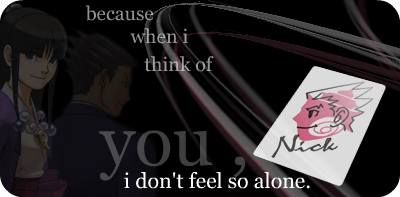justice is always wright ;)
Gender: Male
Rank: Decisive Witness
Joined: Sun Feb 14, 2010 5:53 pm
Posts: 290
however in JFA and T&T you aren't given these types of hints.
and the penalties
there were also hints(other than the rebutal types) in AAI
however
but
it's just that the less difficult the game is,the less tension there is,and the less stakes there are on the line and such,and makes the decision not look as important as they used to.
i just want(excluding the first two cases) a game that has hard decisions(especially towerds the climax),many big penalties at occasions,a few gameover penalties(esspecially towerds the climax) and no type of hint at all........(of course all this excludes from the first two cases
 )
)i know i am going to get shot for suggesting that the last 3 or 2 cases of GS5 shouldn't be relaxing and easy,but who agree's that they should make GS5 as challenging as(if not more chalenging than)JFA and T&T?
i know difficulty doesn't 100% decide the exitment and such,but it really helps.
edit:now that i read this again,i see that this "look's" more like a complaint than a future game suggestion/request

edit2: and i'd like us to be able to present both profiles and evidence freely just like in JFA and T&T
Last edited by Phoenix_Justice on Tue Mar 23, 2010 1:18 pm, edited 1 time in total.

I'm about to tell this guy!
Gender: Male
Location: Montclair, NJ
Rank: Decisive Witness
Joined: Sat Mar 17, 2007 2:01 am
Posts: 274
Very true, you can get a hint on where to focus on the majority of this game's testimonies. Edgeworth usually provides you the hints himself, and in several instances he seems to know the contradiction before the cross-examination even starts. This rarely happened in the PW series, so your thought process was generally in-sync with Phoenix's, both of you figuring it out as you go... Edgeworth's logic pushes you along through even some of the tougher parts, making him seem more like a guide than the character the player takes the role of. AAI was fantastic, no doubt, but I couldn't help but feel I was just going through the motions at times.
justice is always wright ;)
Gender: Male
Rank: Decisive Witness
Joined: Sun Feb 14, 2010 5:53 pm
Posts: 290
Very true, you can get a hint on where to focus on the majority of this game's testimonies. Edgeworth usually provides you the hints himself, and in several instances he seems to know the contradiction before the cross-examination even starts. This rarely happened in the PW series, so your thought process was generally in-sync with Phoenix's, both of you figuring it out as you go... Edgeworth's logic pushes you along through even some of the tougher parts, making him seem more like a guide than the character the player takes the role of. AAI was fantastic, no doubt, but I couldn't help but feel I was just going through the motions at times.
agreed,AAI was extremly enjoyable(first time i really enjoyed invistigations that didn't involve phsych-locks),but we need more chalenge to truly feel that we earned our victory

Btw,i think we should once again be able to present profiles as part of the evidence(just like in JFA and T&T),a really good chalenge was thinking wether to present evidence or profile,at times when you are asked to present evidence it turns out the answer is the profile,and when asked "who", the answer would be evidence instead,i really liked conversing with charectars about charectars during invistigations,and how some testomonies contradict profiles and not evidence.
you know what,i'll later update my post to say the fact that in the next game we should freely be able to present either profile or evidence at ALL TIMES just like in JFA and T&T


Call me Ishmael.
Gender: Male
Location: Sweden
Rank: Ace Attorney
Joined: Sun Apr 12, 2009 4:16 pm
Posts: 2434
With JFA it felt like they were trying too hard to make it harder. Not only are the cases less logical which makes it hard to pick the correct evidence, but the stakes are higher as well. At the end of 2-4 (which was ridiculously hard to begin with) you have to select the right evidence twice in a row - get one wrong and it's game over instantly.
T&T is not too easy, but not too hard either.
AJ:AA is pretty easy, with the exception of the Guide Dang It moments.
AAI:ME is not as easy as AJ:AA and PW:AA, but it's still no pushover.
I say they should make it as hard as T&T.
Gender: Female
Location: Canada
Rank: Decisive Witness
Joined: Sun Jul 12, 2009 9:59 pm
Posts: 158
I really did enjoy presenting profiles to other characters in JFA and in T&T, though that would add more dialogues in the game that might take longer to make/localize. It does make the game harder. Don't you just hate it when you are stuck in the investigation part, and don't know what to do next, and realize later you have to present a profile to someone? But I rather play an enjoyable game with extras and wait longer for it to come out, than a less enjoyable game quickly. But the series is good with or without it. :D
About the difficulty, AAI was easier than the other games, but this is a sequel. Not sure if that changes anything, though. Plus, we are in Edgeworth's shoes. He is more logical than Phoenix and Apollo, so it makes sense that he will give little hints. Edgeworth is not really the type to make crazy accusations, anyway.
And for AJ, since Apollo just started his new series, I like to think that it's as easy as PW1/GS1. I could see the sequels of AJ will be harder like JFA and T&T.
Two more games coming up soon
Gender: Male
Location: Paris
Rank: Prosecutor
Joined: Thu Feb 28, 2008 2:45 pm
Posts: 929
The penalties aren't as harsh, but there's a lot more choices to make, more evidence, you don't always know when you're going to be asked to present something (making cheating more difficult), and the cases are more complex than usual
There were even times where I was genuinely stuck, which is rare for me.
On the whole, I think the difficulty level is fine as it is in AAI. I wouldn't mind at all if they kept it that way for GS5.
Co-creator of New Year's Turnabout, Turnabout Revolution, and At Dawn's Break
justice is always wright ;)
Gender: Male
Rank: Decisive Witness
Joined: Sun Feb 14, 2010 5:53 pm
Posts: 290
The penalties aren't as harsh, but there's a lot more choices to make, more evidence, you don't always know when you're going to be asked to present something (making cheating more difficult), and the cases are more complex than usual
There were even times where I was genuinely stuck, which is rare for me.
On the whole, I think the difficulty level is fine as it is in AAI. I wouldn't mind at all if they kept it that way for GS5.
ahhh,the old save/load cheating trick


personally i'd really like it if you weren't able to save during the cross-examination,some gamers tend to just throw every evidence with the save/load trick when they are stuck and not try to think logically about it instead.
i admit that i used to use that tecknique in AA case 5 and the first parts of JFA(case 2-2 and 2-3
 ,but i truly begun to stop that type of cheating since case 2-4
,but i truly begun to stop that type of cheating since case 2-4

Stupid character limit.
Gender: Female
Rank: Desk Jockey
Joined: Wed Mar 10, 2010 8:06 am
Posts: 51
I loved AAI, but it was a bit easy and predictable, the killers weren't as creative and hard to catch, imo.
Me too, and I think that was another reason why JFA and T&T were harder; being able to present profiles as well as evidence adds a lot more possibilities to what you can do during testimonies.
And in answer to your question, I agree with him:

What the Devil is going on here?
Gender: Female
Location: Sydney, Australia
Rank: Prosecutor
Joined: Mon Jun 01, 2009 10:18 am
Posts: 905
(lol when I saw the name of this I was like "mrs d mrs i mrs f-f-i mrs c mrs u mrs l-t-y! Wait why are all these women married?)
Godot rules
Gender: None specified
Rank: Suspect
Joined: Sat Apr 03, 2010 3:22 pm
Posts: 3
PL vs PW <33
Gender: Female
Location: Canada
Rank: Decisive Witness
Joined: Thu Apr 01, 2010 9:12 pm
Posts: 260
Yeah, that's the exact feeling I got. in PW I often had no idea where
 was going with his train of thought until like a moment before he had to present something (like "Eureka! so that's what's going on), and I pieced it together with Nick. But with AAI, often I already know what happened before it even started. It was more like "I already know exactly what happened, now I just need to prove it to your face" instead of "speak first, I'll figure it out later" . But I guess those situations do suit the characters... but it just gets a bit tedious when Edgey has to explain to the other characters (he talks quite a lot XD). And because Edgey talks a lot and gives you all sorts of hints, the plot twists and revelations end up not being as sudden as in PW.
was going with his train of thought until like a moment before he had to present something (like "Eureka! so that's what's going on), and I pieced it together with Nick. But with AAI, often I already know what happened before it even started. It was more like "I already know exactly what happened, now I just need to prove it to your face" instead of "speak first, I'll figure it out later" . But I guess those situations do suit the characters... but it just gets a bit tedious when Edgey has to explain to the other characters (he talks quite a lot XD). And because Edgey talks a lot and gives you all sorts of hints, the plot twists and revelations end up not being as sudden as in PW.And another thing I found easier with AAI is the investigation part itself. You're usually confined to an area to investigate, and you talk to people less than in PW. in PW, there are many areas to move around in, and often times you have to present stuff to people to get them to talk to you more (and the stuff you present can only be obtained if you do something in a different area); this part got me stuck so many times, because the game doesn't move forward until you've completed talking to people >__<
And with the logic system, I found it easier than Magatama and Perceive. Usually there aren't many logic pieces, and by process of elimination, you can usually guess what goes with what, even if you don't fully understand how they connect (sometimes I felt the connection was pretty weak, but there's only 2 or 3 pieces, so they must go together somehow, and I end up getting surprised, thinking "what, they fit together? O__o ). With Magatama, you need to have the right piece of evidence, that sometimes you don't even have yet (but you don't know if you have the right evidence or not). With perceive, you need to know which statement to perceive at; you can usually guess and narrow it down to 1 or 2, but looking for tiny twitches is still hard... not to mention kinda annoying... DX
I'm not sure if I like it being easier or not, since I don't like being stuck and not able to move forward in the storyline. I felt AAI wasn't as challenging though, and I like having the revelation along with Phoenix part XD
Lastly, the evidence in AAI makes more sense, or at least easier to correlate to the logic at hand. Not to say PW games didn't, but a lot of times I knew what I had to do or what I wanted to say, but don't know how to say it (ie which evidence would be the best to prove my point). For example, in JFA 2-4
But AAI has different play style than the others, and what I mentioned above could be a result of that. I still felt AJ to be easier than the PW trilogy, because the investigations are shorter (less of the 3 day trials thing, which I liked), and in court, Klavier actually helps you out instead of wanting to destroy you by hiding evidence and utterly refute your claim.

devART:.:My wallpapers:.:My comics/fanart:.:Sprite edits:.:Objection font
justice is always wright ;)
Gender: Male
Rank: Decisive Witness
Joined: Sun Feb 14, 2010 5:53 pm
Posts: 290
Gumshoe's #1 Fan
Gender: Male
Rank: Desk Jockey
Joined: Sun Feb 28, 2010 9:50 pm
Posts: 57
The penalties aren't as harsh, but there's a lot more choices to make, more evidence, you don't always know when you're going to be asked to present something (making cheating more difficult), and the cases are more complex than usual
There were even times where I was genuinely stuck, which is rare for me.
On the whole, I think the difficulty level is fine as it is in AAI. I wouldn't mind at all if they kept it that way for GS5.
I think it was great too, and it had its hard moments, but as a whole the difficulty was wildly unbalanced. You jump from the most obvious thing in the world to random guesswork to moderately difficult to making huge logic leaps. It could and should have been far smoother.
Here's how I see the difficulties:
1. T&T: So, admittedly the last thing you had to present was pretty obvious, but it was still enjoyably hard throughout.
2. PW:AA: The court sequences were pretty easy, but the investigations were huge treks of guesswork and randomly doing nonsensical things. Not the good kind of hard, but this was the first game, after all.
3. JFA: Last case=hellishly hard, Other than a few testimonies in the other cases, though, it was pretty easy.
4. AJ:AA: A few things were hard, but overall pretty easy. The only part I was stuck on for any considerable length of time was Spark Brushel's testimony.
5. AAI: Except case 3, mostly pretty easy.
I want a game with difficulty about on par with T&T. That was easily the best game in the series, and I want another AA experience to equal it.


Save poor Gumshoe!
Gender: Male
Location: The Netherlands
Rank: Desk Jockey
Joined: Mon Mar 01, 2010 5:12 pm
Posts: 112
Here's how I see the difficulties:
1. T&T: So, admittedly the last thing you had to present was pretty obvious, but it was still enjoyably hard throughout.
2. PW:AA: The court sequences were pretty easy, but the investigations were huge treks of guesswork and randomly doing nonsensical things. Not the good kind of hard, but this was the first game, after all.
3. JFA: Last case=hellishly hard, Other than a few testimonies in the other cases, though, it was pretty easy.
4. AJ:AA: A few things were hard, but overall pretty easy. The only part I was stuck on for any considerable length of time was Spark Brushel's testimony.
5. AAI: Except case 3, mostly pretty easy.
I want a game with difficulty about on par with T&T. That was easily the best game in the series, and I want another AA experience to equal it.
I think that T&T had the right difficulty too, And I hope that GS5 harder is then AJ.

Surf's Up!
Gender: Male
Location: The gloomiest place on earth (i.e. the UK)
Rank: Ace Attorney
Joined: Fri Nov 16, 2007 1:34 pm
Posts: 2257
I wouldn't say that AAI was an easy game as such, but I sure would say AJ was (and I don't abuse the save/load feature btw). In fact in my first playthrough of AJ there were only 2 or 3 times when I got stuck, wich is much less than in any other game in the AA series.
Gumshoe's #1 Fan
Gender: Male
Rank: Desk Jockey
Joined: Sun Feb 28, 2010 9:50 pm
Posts: 57
True, but sometimes the hole in the testimony isn't very logical. And other than Case 3 and a few parts of Case 5, AAI is very easy, even without the save/load abuse. AJ, not so much, but not as hard as the PW games.

justice is always wright ;)
Gender: Male
Rank: Decisive Witness
Joined: Sun Feb 14, 2010 5:53 pm
Posts: 290

Who is online
You cannot reply to topics in this forum
You cannot edit your posts in this forum
You cannot delete your posts in this forum
You cannot post attachments in this forum









